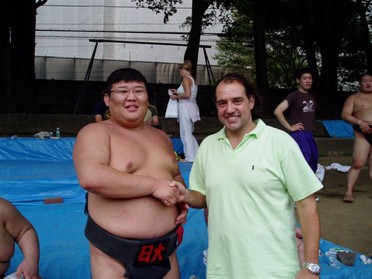| Yokozuna Comparisons Joe Kuroda |

 |
| Amateur Sumo's Global Aspirations Courtesy: International Sumo Federation |

 |
| Rikishi of Old Joe Kuroda |

 |
| Heya Peek Barbara Ann Klein |

 |
| SFM Interview Mark Buckton |

 |
| Sumo 101 Barbara Ann Klein |

 |
| Photo Bonanza See the Haru |
 |
| Haru Basho Review Lon Howard |

 |
| Lower Division Rikishi Mikko Mattila |

 |
| Natsu Basho Forecast Mark Buckton |

 |
| Kimarite Focus Mikko Mattila |

 |
| Sumo in Print Mark Buckton |

 |
| Kokugi Connections Todd Lambert |

 |
| Fan Debate Facilitator – Lon Howard |

 |
| SFM Cartoons Benny Loh & Stephen Thompson |

 |
| Let’s Hear From You What was it that |

 |
| Readers’ Letters See what some |

 |
Sumo Quiz
The Quizmaster
Answer the Qs and win yourself next basho’s banzuke.
MB – A large number of federations around the world don't seem to be that active in the sport, but as General Secretary of the strongest continental body, how do you view this apparent lack of interest elsewhere?
SG – We are democratic in our approach to sumo in Europe and see a future for sumo here. We really do love the sport and want to see it as an Olympic sport. That's why we are investing as we do in sumo. If you are short-sighted and
MB – Do you see any room for improvement in global amateur sumo organizations and if so, along what lines?
SG – Yes – if continental federations are allowed to offer advice and help (to the IFS). We may not have a history of 1500 years of sumo but we are not living in the dark ages here. With expert advice on weight-
MB – Do you think the International Sumo Federation will be successful in its IOC bid?
SG – That depends on who is advising and contributing to the
Next

General Secretary Stephen Gadd meeting an amateur Japanese rikishi
